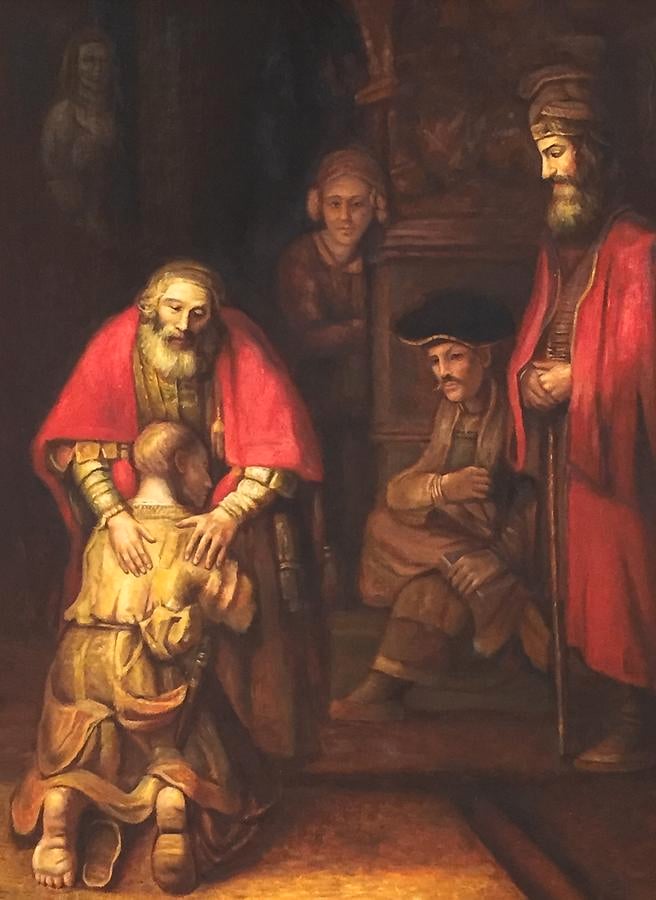
To listen to today’s reflection as a podcast, click here
There’s more than one way to sabotage a relationship with God.
Jesus’ parable of the lost son (Luke 15:11-32) is the story of an irresponsible kid who utterly deep-sixes his connection with his father.
He arrogantly runs off with a huge chunk of the family’s net worth.
Basically the young man says, “Dad, you’re no good to me alive. So let’s go ahead and pretend you’re dead. I want my inheritance – right now.” A message like that would seriously wound any parent-child relationship in any culture. But in the ancient Middle East, where family was everything, this amounted to an unforgivable disgrace.
The kid promptly blows his entire stash. Suddenly, his VISA card is rejected. He has no 401(k). All of the props in his life are gone.
What can he do?
He decides to stagger home. No doubt he expects to receive the kind of public beating he richly deserves. But at least his father might let him have access to a bunk in the barn.
That’s when his dad (who represents God the Father) provides the ultimate surprise.
Instead of drowning his son in a storm surge of shame, the father runs to embrace him. He restores this child who is incapable of healing himself. Then he announces, “It’s party time, everyone. Let’s celebrate this good news!” The dramatic reunion is captured above in Rembrandt’s famous painting, The Return of the Prodigal, which hangs in the Hermitage Museum in St. Petersburg, Russia.
But who’s that figure lurking in the background, just over the father’s left shoulder?
That’s the older brother. Many Bible commentators believe that Jesus’ parable wasn’t nearly so much about the irresponsible kid who ran away as about the hyper-responsible son who stayed home.
After the father lavishes grace on junior, he turns to his firstborn: “Something wonderful is happening here, and you need to be part of it!” He beckons his older son to plunge into the family celebration.
But big brother is having none of it.
He snaps at his father, “Look! All these years I’ve been slaving for you and never disobeyed your orders” (Luke 15:29).
Like countless religious people over the past twenty centuries, he is proud of his spiritual track record. He’s not a screw-up. Why should he welcome back his loser brother, who cost the family a fortune? Speaking to his father in verse 30 he says, “But when this son of yours…” In other words: Dad, this kid belongs to you. He’s no relation or responsibility of mine.
In general terms, there are two ways to subvert a relationship with God. You can be “very bad,” like the younger son. Or you can aim to be “very good,” like his older brother. Both accomplish the tragedy of spiritual estrangement.
Church people have historically turned their guns on those who seem to be very bad. Sermons warn parishioners not to compromise their morals. We must not go off the deep end behaviorally. If a prodigal actually sticks his head back into the sanctuary, he or she should be greeted warily. Grace may be an interesting idea – theoretically, at least – but there’s no need to go overboard.
It’s easy to see why so many religious people side with the older brother. Churches turn out to be perfect hiding places for those who are committed to being “good.”
You can sing in the choir, memorize Bible verses, and make sure your name never appears in the local police blotter – all the while sighing, “God has every reason to be proud of me,” even while nurturing attitudes that are light years away from what God is actually thinking and feeling.
In verse 32, the father in Jesus’ story gently turns the tables. He says to his older son, “We had to celebrate and be glad, because this brother of yours was dead and is alive again; he was lost and is found.”
That’s God’s call to each one of us.
We need to claim each other. We need to say, concerning other people – no matter what kind of mess they have made of their lives – “this sister of mine; this brother of ours.”
It’s clear in Jesus’ parable that both brothers are in desperate need of the father’s grace – not just the one who ran away, but the one who stayed home and clings to his Sunday School perfect attendance pin.
If we find ourselves thinking, “I wonder which of these two sons I tend to be,” the answer, clearly, is both.
All of us flee God in matters both large and small. And there is also (deeply ingrained within each of us) something twisted that makes us want to stand back and hope that while our names will appear on the guest list for God’s heavenly feast, those other (undeserving) people will have to stay home and settle for TV dinners.
What’s really interesting about Jesus’ story is that it doesn’t have an ending.
It just hangs there in mid-air.
The father is left standing outdoors, just beyond the music and laughter of the celebration, pleading with his older son to come join the party.
It’s as if Jesus himself is appealing directly to us:
“My Father is generous, more generous than you can possibly imagine.
“So how about you? Will you choose to put on your heart what my Father has on his heart?”
